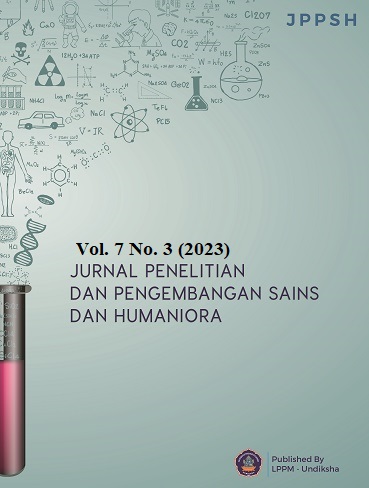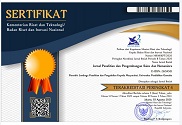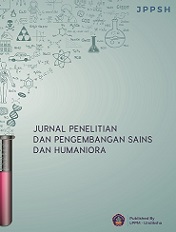The Influence of Good Corporate Governance, CEO Tenure, and Corporate Financial Performance on Company Value
DOI:
https://doi.org/10.23887/jppsh.v7i3.73854Keywords:
Governance, CEO Tenure, Financial Performance, Firm ValueAbstract
Firm value is very important in an organization because it is related to the welfare of investors. The higher the company value causes the company to have a superior image and the value of the resources claimed by the company can be an impression of the company's value. But in society, there are phenomena and tendencies of individual behavior in choosing to invest. This study aims to determine the effect of good corporate governance, CEO tenure, and company financial performance on firm value. This type of research is quantitative research. This study uses secondary data from the Indonesia Stock Exchange. The population in this study are transportation sector companies listed on the Indonesia Stock Exchange in 2016-2020, totaling 8 companies. The sampling technique uses a side purposive technique. The dependent variable in this study is firm value as measured by Tobins'q. The independent variables in this study are good corporate governance which is proxied by the audit committee, company secretary, and remuneration committee, CEO tenure, and the company's financial performance which is proxied by ROA. The results of this study indicate that (1) the corporate secretary affects firm value; (2) the audit committee affects firm value; (3) the remuneration committee has an effect on firm value; (4) CEO tenure has an influence on firm value; and (5) ROA affects company value in various industrial sub-sectors listed on the IDX in 2016-2020. The results of this study expect that investors should always pay attention to internal and external elements in organizational valuation, namely the earth, social and financial benefits, which these three things must be balanced.
References
Agung, G., Hasnawati, S., & Huzaimah, R. F. (2021). The effect of investment decision, financing decision, dividend policy on firm value. Jurnal Bisnis Dan Manajemen, 17(1). https://doi.org/10.23960/jbm.v17i1.189.
Ahmed Sheikh, N., Wang, Z., & Khan, S. (2013). The impact of internal attributes of corporate governance on firm performance: Evidence from Pakistan. International Journal of Commerce and Management, 23(1), 38–55. https://doi.org/10.1108/10569211311301420.
Aisyah, S., Hariadi, B., & Mardiati, E. (2021). The effect of Islamic intellectual capital, corporate governance, and corporate social responsibility disclosure on maqashid sharia performance, with reputation as a moderating variable. International Journal of Research in Business and Social Science, 10(4), 75–84. https://doi.org/10.20525/ijrbs.v10i4.1233.
Al-ahdal, W. M., & Hashim, H. A. (2022). Impact of audit committee characteristics and external audit quality on firm performance: evidence from India. Corporate Governance: The International Journal of Business in Society, 22(2), 424–445. https://doi.org/10.1108/CG-09-2020-0420.
Anik, S., Chariri, A., & Isgiyarta, J. (2021). The effect of intellectual capital and good corporate governance on financial performance and corporate value: A case study in Indonesia. The Journal of Asian Finance, Economics and Business, 8(4), 391–402. https://doi.org/10.13106/jafeb.2021.vol8.no4.0391.
Bon, S. F., & Hartoko, S. (2022). The effect of dividend policy, investment decision, leverage, profitability, and firm size on firm value. European Journal of Business and Management Research, 7(3), 7–13. https://doi.org/10.24018/ejbmr.2022.7.3.1405.
Bouaziz, D., Salhi, B., & Jarboui, A. (2020). CEO characteristics and earnings management: empirical evidence from France. Journal of Financial Reporting and Accounting, 18(1), 77–110. https://doi.org/10.1108/JFRA-01-2019-0008.
Chaudhry, N. I., Roomi, M. A., & Aftab, I. (2020). Impact of expertise of audit committee chair and nomination committee chair on financial performance of firm. Corporate Governance: The International Journal of Business in Society, 20(4), 621–638. https://doi.org/10.1108/CG-01-2020-0017.
Dasuki, R. E., & Lestari, A. (2019). Implementation of Good Corporate Governance to the Value of Cooperative Company. Journal of Economic Empowerment Strategy (JEES), 2(1), 24–41. https://doi.org/10.30740/jees.v2i1.33.
Delen, D., Kuzey, C., & Uyar, A. (2013). Measuring firm performance using financial ratios: A decision tree approach. Expert Systems with Applications, 40(10), 3970–3983. https://doi.org/10.1016/j.eswa.2013.01.012.
Deschenes, S., Boubacar, H., Rojas, M., & Morris, T. (2015). Is top-management remuneration influenced by board characteristics? International Journal of Accounting & Information Management, 23(1), 60–79. https://doi.org/10.1108/IJAIM-11-2013-0062.
Devie, D., Liman, L. P., Tarigan, J., & Jie, F. (2020). Corporate social responsibility, financial performance and risk in Indonesian natural resources industry. Social Responsibility Journal, 16(1), 73–90. https://doi.org/10.1108/SRJ-06-2018-0155.
Feviana, D. L., & Supatmi, S. (2021). Good corporate governance affects company value with earnings management as intervening variables in BUMN. International Journal of Social Science and Business, 5(1), 16–25. https://doi.org/10.23887/ijssb.v5i1.31530.
Fiordelisi, F., & Ricci, O. (2014). Corporate culture and CEO turnover. Journal of Corporate Finance, 28, 66–82. https://doi.org/10.1016/j.jcorpfin.2013.11.009.
Hapsari, A. A. (2018). Pengaruh good corporate governance (GCG) dan corporate social responsibility terhadap nilai perusahaan. Jurnal Bakti Masyarakat Indonesia, 1(1). https://doi.org/10.24912/jbmi.v1i1.1900.
Irawanto, D. W., Gondomono, H., & Hussein, A. S. (2017). The effect of intellectual capital on a company’s performance moderated by ITS governance and IT strategy integration employed by bank listed in Indonesian stock exchange. The South East Asian Journal of Management, 11(2), 1. https://doi.org/10.21002/seam.v11i2.8522.
Isidro, H., & Sobral, M. (2015). The effects of women on corporate boards on firm value, financial performance, and ethical and social compliance. Journal of Business Ethics, 132, 1–19. https://doi.org/10.1007/s10551-014-2302-9.
Jihadi, M., Vilantika, E., Hashemi, S. M., Arifin, Z., Bachtiar, Y., & Sholichah, F. (2021). The effect of liquidity, leverage, and profitability on firm value: Empirical evidence from Indonesia. The Journal of Asian Finance, Economics and Business, 8(3), 423–431. https://doi.org/10.13106/jafeb.2021.vol8.no3.0423.
Konadu, R., Owusu‐Agyei, S., Lartey, T. A., Danso, A., Adomako, S., & Amankwah‐Amoah, J. (2020). CEOs’ reputation, quality management and environmental innovation: The roles of stakeholder pressure and resource commitment. Business Strategy and the Environment, 29(6), 2310–2323. https://doi.org/10.1002/bse.2504.
Kostruba, A., Maydanyk, R. A., & Luts, V. V. (2020). Bonum requirements of the beneficiary in the corporate rights protection system in Ukraine: Implementing best practices. The Asian International Journal of Life Sciences, 22(1), 1–19. https://hal.science/hal-02910169v1/document.
Kurnia, P., Darlis, E., & PUTR, A. A. (2020). Carbon emission disclosure, good corporate governance, financial performance, and firm value. The Journal of Asian Finance, Economics and Business, 7(12), 223–231. https://doi.org/10.13106/jafeb.2020.vol7.no12.223.
Listyaningsih, E., Dewi, R., & Baiti, N. (2018). The effect of good corporate governance on corporate social responsibility disclosure on Jakarta Islamic index. Indonesian Journal of Business and Entrepreneurship (IJBE), 4(3), 273–273. https://doi.org/10.17358/ijbe.4.3.273.
Luthan, E., & Satria, I. (2016). The effect of good corporate governance mechanism to earnings management before and after IFRS Convergence. Procedia-Social and Behavioral Sciences, 219, 465–471. https://doi.org/10.1016/j.sbspro.2016.05.021.
Luthfiah, A. A., & Suherman, S. (2018). The effects of financial performance toward firm value with ownership structure as moderating variable (the study on manufacturing companies listed in Indonesia Stock Exchange in the period of 2012-2016). Journal of Business and Behavioural Entrepreneurship, 2(1), 18–27. https://doi.org/10.21009/JOBBE.002.1.03.
Machmuddah, Z., Sari, D. W., & Utomo, S. D. (2020). Corporate social responsibility, profitability and firm value: Evidence from Indonesia. The Journal of Asian Finance, Economics and Business, 7(9), 631–638. https://doi.org/10.13106/jafeb.2020.vol7.no9.631.
Michelon, G., Bozzolan, S., & Beretta, S. (2015). Board monitoring and internal control system disclosure in different regulatory environments. Journal of Applied Accounting Research, 16(1), 138–164. https://doi.org/10.1108/JAAR-03-2012-0018.
Mukhtaruddin, M., Ubaidillah, U., Dewi, K., Hakiki, A., & Nopriyanto, N. (2019). Good corporate governance, corporate social responsibility, firm value, and financial performance as moderating variable. Indonesian Journal of Sustainability Accounting and Management, 3(1), 55â – 64. https://doi.org/10.15562/ijsam.v3i1.74.
Munisi, G., & Randøy, T. (2013). Corporate governance and company performance across Sub-Saharan African countries. Journal of Economics and Business, 70, 92–110. https://doi.org/10.1016/j.jeconbus.2013.08.003.
Murniati, S., Mus, H. A. R., Semmaila, H. B., & Nur, A. N. (2019). Effect of investment decisions, financing decisions and dividend policy on profitability and value of the firm. International Journal of Accounting & Finance in Asia Pasific (IJAFAP), 2(1). https://doi.org/10.32535/ijafap.v2i1.359.
Muttakin, M. B., Khan, A., & Mihret, D. G. (2018). The effect of board capital and CEO power on corporate social responsibility disclosures. Journal of Business Ethics, 150, 41–56. https://doi.org/10.1007/s10551-016-3105-y.
Nur’ainy, R., Nurcahyo, B., Sri Kurniasih, A., & Sugiharti, B. (2013). Implementation of Good Corporate Governance and Its Impact on Corporate Performance: The Mediation Role of Firm Size (Empirical Study from Indonesia). Global Business & Management Research, 5(2), 91–104.
Oh, W. Y., Chang, Y. K., & Jung, R. (2018). Experience-based human capital or fixed paradigm problem? CEO tenure, contextual influences, and corporate social (ir) responsibility. Journal of Business Research, 90, 325–333. https://doi.org/10.1016/j.jbusres.2018.05.034.
Pangaribuan, H., Donni, R. W. P., Popoola, O. M. J., & Sihombing, J. (2019). Exploration disclosures of internal control as the impact of earnings quality and audit committee. Indian-Pacific Journal of Accounting and Finance, 3(1), 4–22. https://doi.org/10.52962/ipjaf.2019.3.1.61.
Purbawangsa, I. B. A., Solimun, S., Fernandes, A. A. R., & Mangesti Rahayu, S. (2020). Corporate governance, corporate profitability toward corporate social responsibility disclosure and corporate value (comparative study in Indonesia, China and India stock exchange in 2013-2016). Social Responsibility Journal, 16(7), 983–999. https://doi.org/10.1108/SRJ-08-2017-0160.
Regoliosi, C., & D’Eri, A. (2014). “Good” corporate governance and the quality of internal auditing departments in Italian listed firms. An exploratory investigation in Italian listed firms. Journal of Management & Governance, 18, 891–920. https://doi.org/10.1007/s10997-012-9254-1.
Saidat, Z., Silva, M., & Seaman, C. (2019). The relationship between corporate governance and financial performance: Evidence from Jordanian family and nonfamily firms. Journal of Family Business Management, 9(1), 54–78. https://doi.org/10.1108/JFBM-11-2017-0036.
Salloum, C., Azzi, G., & Gebrayel, E. (2014). Audit committee and financial distress in the middle east context: Evidence of the Lebanese financial institutions. International Strategic Management Review, 2(1), 39–45. https://doi.org/10.1016/j.ism.2014.09.001.
Setiawan, M. R., Susanti, N., & Nugraha, N. M. (2021). Pengaruh Struktur Modal, Perputaran Modal Kerja, dan Ukuran Perusahaan Terhadap Nilai Perusahaan. Owner: Riset Dan Jurnal Akuntansi, 5(1), 208–218. https://doi.org/10.33395/owner.v5i1.383.
Setyahadi, R. R., & Narsa, I. (2020). Corporate governance and sustainability in Indonesia. The Journal of Asian Finance, Economics and Business, 7(12), 885–894. https://doi.org/10.13106/jafeb.2020.vol7.no12.885.
Shank, T., Paul Hill, R., & Stang, J. (2013). Do investors benefit from good corporate governance? Corporate Governance: The International Journal of Business in Society, 13(4), 384–396. https://doi.org/10.1108/CG-03-2010-0027.
Sudarmanto, E., Susanti, E., Revida, E., Pelu, M. F. A., Purba, S., Astuti, A., & Krisnawati, A. (2021). Good Corporate Governance (GCG). Yayasan Kita Menulis.
Sugiarto, I. (2017). The Significance of Good Corporate Governance Principles in The Company Law of 2007. MIMBAR: Jurnal Sosial Dan Pembangunan, 33(1), 37–45. https://doi.org/10.29313/mimbar.v33i1.2067.
Suprayitno, E., & Hardiani, R. M. (2021). A spatial analysis of non-performance financing determinants in Islamic banks in Indonesia. Jurnal Ekonomi & Keuangan Islam, 7(2). https://doi.org/10.20885/jeki.vol7.iss2.art7.
Tandean, V. A., & Winnie. (2016). The effect of good corporate governance on tax avoidance: An empirical study on manufacturing companies listed in IDX period 2010-2013. Asian Journal of Accounting Research, 1(1), 28–38. https://doi.org/10.1108/AJAR-2016-01-01-B004
Downloads
Published
Issue
Section
License
Copyright (c) 2024 I Gusti Made Priyambhada Putra, Sunitha Devi

This work is licensed under a Creative Commons Attribution-ShareAlike 4.0 International License.
Authors who publish with the Jurnal Penelitian dan Pengembangan Sains dan Humaniora agree to the following terms:
- Authors retain copyright and grant the journal the right of first publication with the work simultaneously licensed under a Creative Commons Attribution License (CC BY-SA 4.0) that allows others to share the work with an acknowledgment of the work's authorship and initial publication in this journal.
- Authors are able to enter into separate, additional contractual arrangements for the non-exclusive distribution of the journal's published version of the work (e.g., post it to an institutional repository or publish it in a book), with an acknowledgment of its initial publication in this journal.
- Authors are permitted and encouraged to post their work online (e.g., in institutional repositories or on their website) prior to and during the submission process, as it can lead to productive exchanges, as well as earlier and greater citation of published work. (See The Effect of Open Access)










